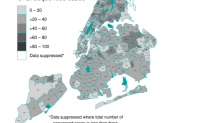What to Know
- The NYC COVID variant does not make you sicker or more likely to be infected after vaccination compared to "regular" COVID, the CDC says
- Also known as B.1.526, the variant first popped up in Washington Heights in Nov. 2020
- It now accounts for as much as 40% of all new COVID-19 cases in the city, based on laboratory sampling
The so-called "NYC variant" of COVID-19 does not appear to cause more severe disease than other versions of the virus, nor does it appear to increase reinfection risk, the CDC said in a new report Wednesday.
Also known as B.1.526, the variant first appeared in Nov. 2020 in Washington Heights and spread rapidly. By early April, the CDC said, it accounted for 40 percent of all city cases in a representative sample tested by two labs.
For the last few months, the city has warned it was too soon to tell whether this new variant was more dangerous than the "original" COVID, or as or more dangerous than other variants like those found in the UK, South Africa and Brazil.
Get Tri-state area news and weather forecasts to your inbox. Sign up for NBC New York newsletters.
The CDC's report appears to put at least some of those fears to rest.
"Preliminary evidence suggests that, to date, B.1.526 does not lead to more severe disease or increased risk for infection after vaccination," the CDC said.
The agency added that the presence of a particular mutation in some cases of the NYC variant -- one known to otherwise interfere with antibodies -- did not seem to make this variant any worse either.
"Although the SARS-CoV-2 B.1.526 variant emerged rapidly in NYC, early evidence suggests that this variant, even with the E484K mutation, does not lead to more severe disease and is not associated with increased risk for breakthrough infection
or reinfection compared with other sequenced SARS-CoV-2 viruses," the CDC said.
The NYC variant, along with the U.K. (B.1.1.7), Brazilian (P.1) and South African (B.1.351) strains have proven to all be more transmissible than earlier strains of COVID, which is why they are known as "variants of concern" or "variants of interest."
The B.1.1.7 strain is described as a "variant of concern" because evidence shows it causes more severe infections than earlier strains. It may also be more lethal. The P.1 variant also is considered a variant of concern because evidence shows antibodies from previous infection or from vaccination may be less effective against it.
The B.1.526 and B.1.1.7 variants have been detected in all five boroughs, though the former is slightly more common in the Bronx and parts of Queens. The U.K. strain is slightly more common in southern Brooklyn, eastern Queens and Staten Island.
"To date, reinfection cases and cases in people who were fully vaccinated are rare. It is too early to know if either of these variants are more likely to cause reinfection or vaccine breakthrough compared to other previously circulating variants," Health Commissioner Dr. Chave Chokshi said last month. "The increase in proportion of cases that are variants indicates that they may be more transmissible, so New Yorkers should continue to get vaccinated when eligible and adhere to the Core Four."

Not sure how the process works? Check out our handy tri-state vaccine site finder and FAQs here
The South African and Brazilian variants, B.1.351 and P.1., remain less common but the prevalence of each continues to rise nationally. The South African variant has been detected in at least 453 U.S. samples in 36 states, while the P.1. strain has been found in nearly 500 samples in 31 states, the CDC says. Genomic sequencing to detect variants is an exhaustive process. The CDC had only been assessing a small fraction of cases up until recent months; then the presence of more transmissible strains boomed.
New York and New Jersey have stepped up their genomic sequencing efforts as well. The city has sequenced more than 5 percent of specimens from confirmed cases in recent weeks, which is high.
Overall, the three vaccines federally authorized for emergency use nationally are said to be highly effective at reducing severe outcomes and deaths associated with COVID-19; they are also believed to be effective in preventing new infections. Here's everything you need to know about the Big 3, including how effective each is and how they compare.
The hope -- and the plan -- is that increased vaccinations will outpace the spread of variants eventually and that people will adhere to precautions until it does.



